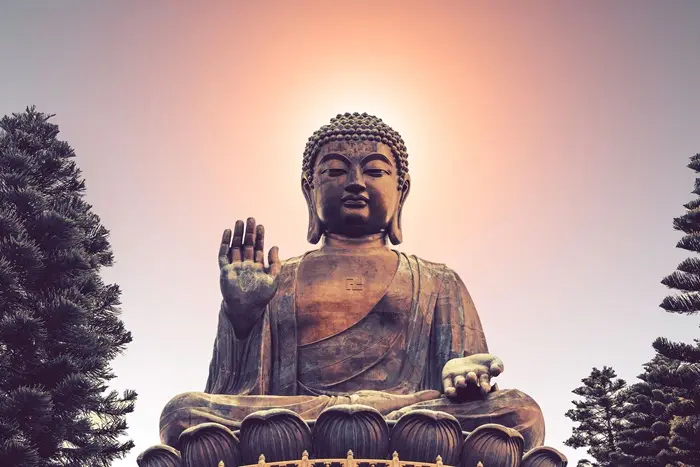Mahayana Buddhism is one of the two main branches of Buddhism, the other being Theravada Buddhism. It is widely practiced in countries like China, Japan, Korea, and Vietnam. But who promoted Mahayana Buddhism? This article will explore the key figures and historical events that helped spread Mahayana Buddhism.
The Origins of Mahayana Buddhism
Early Buddhism
Buddhism began with Siddhartha Gautama, known as the Buddha, around 2,500 years ago in India. After his enlightenment, he taught the Four Noble Truths and the Eightfold Path. His teachings were passed down orally and later written in texts.
The Split
Around the 1st century BCE, Buddhism split into two main branches: Theravada and Mahayana. Theravada focused on the original teachings of the Buddha, while Mahayana introduced new ideas and practices.
Key Figures in Promoting Mahayana Buddhism
Nagarjuna
Who Was Nagarjuna?
Nagarjuna was an Indian philosopher who lived around the 2nd century CE. He is considered one of the most important figures in Mahayana Buddhism.
His Contributions
Nagarjuna developed the concept of “Sunyata” or “Emptiness.” He argued that all things are empty of inherent existence. This idea became central to Mahayana philosophy.
Asanga and Vasubandhu
Who Were They?
Asanga and Vasubandhu were brothers who lived in the 4th century CE. They were key figures in the Yogacara school of Mahayana Buddhism.
Their Contributions
Asanga wrote several texts that explained the Yogacara philosophy, which focuses on the mind and consciousness. Vasubandhu expanded on these ideas and wrote commentaries that are still studied today.
Kumarajiva
Who Was Kumarajiva?
Kumarajiva was a Buddhist monk and scholar who lived in the 4th century CE. He was born in Kucha, a kingdom in Central Asia.
His Contributions
Kumarajiva translated many Mahayana texts into Chinese. His translations were clear and accurate, making Mahayana teachings more accessible to Chinese people.
Historical Events That Promoted Mahayana Buddhism
The Silk Road
What Was the Silk Road?
The Silk Road was a network of trade routes that connected Asia, Europe, and Africa. It was not just for goods but also for ideas, including religion.
How It Helped
Buddhist monks traveled along the Silk Road, spreading Mahayana teachings. They established monasteries and translated texts into local languages.
The Kushan Empire
Who Were the Kushans?
The Kushan Empire was a powerful state in Central Asia and Northern India from the 1st to 3rd centuries CE.
Their Role
The Kushan kings supported Buddhism and helped spread Mahayana teachings. They built stupas and monasteries and sponsored Buddhist art.
The Gupta Empire
Who Were the Guptas?
The Gupta Empire ruled much of India from the 4th to 6th centuries CE. It is often called the “Golden Age” of India.
Their Role
The Gupta kings were patrons of Buddhism. They supported Buddhist universities like Nalanda, where Mahayana teachings were studied and promoted.
Mahayana Buddhism in Different Countries
China
Early Spread
Mahayana Buddhism reached China around the 1st century CE. It was initially mixed with local beliefs and practices.
Key Figures
Monks like Kumarajiva and Xuanzang played crucial roles in translating and spreading Mahayana texts in China.
Japan
Introduction
Mahayana Buddhism was introduced to Japan in the 6th century CE. It was brought by monks and scholars from Korea and China.
Key Schools
Schools like Tendai and Shingon were established, each promoting different aspects of Mahayana teachings.
Korea
Early Spread
Mahayana Buddhism reached Korea in the 4th century CE. It was brought by Chinese monks and scholars.
Key Figures
Monks like Wonhyo and Uisang were instrumental in spreading Mahayana teachings in Korea.
Vietnam
Early Spread
Mahayana Buddhism was introduced to Vietnam around the 2nd century CE. It was influenced by both Indian and Chinese Buddhism.
Key Figures
Monks like Vinitaruci and Phap Hien played important roles in spreading Mahayana teachings in Vietnam.
The Role of Texts in Promoting Mahayana Buddhism
The Lotus Sutra
What Is the Lotus Sutra?
The Lotus Sutra is one of the most important texts in Mahayana Buddhism. It teaches that all beings have the potential to become Buddhas.
Its Impact
The Lotus Sutra has been widely studied and revered. It has inspired many practices and rituals in Mahayana Buddhism.
The Heart Sutra
What Is the Heart Sutra?
The Heart Sutra is a short but profound text that explains the concept of emptiness.
Its Impact
The Heart Sutra is often recited in Mahayana rituals. It is considered a summary of Mahayana philosophy.
The Diamond Sutra
What Is the Diamond Sutra?
The Diamond Sutra is another important text that discusses the nature of reality and enlightenment.
Its Impact
The Diamond Sutra has been widely studied and commented upon. It is one of the oldest printed texts in the world.
The Role of Art and Architecture
Buddhist Art
What Is Buddhist Art?
Buddhist art includes statues, paintings, and other forms of visual art that depict the Buddha and other important figures.
Its Role
Buddhist art has played a crucial role in spreading Mahayana teachings. It helps people visualize and understand complex ideas.
Buddhist Architecture
What Is Buddhist Architecture?
Buddhist architecture includes stupas, temples, and monasteries.
Its Role
Buddhist architecture has helped spread Mahayana Buddhism by providing places for worship and study. It also serves as a symbol of the religion.
Conclusion
Mahayana Buddhism has been promoted by many key figures and historical events. From philosophers like Nagarjuna to empires like the Kushans, each played a crucial role in spreading Mahayana teachings. Texts like the Lotus Sutra and art and architecture have also helped make Mahayana Buddhism accessible to people around the world. Today, Mahayana Buddhism continues to be a vibrant and influential branch of Buddhism.
By understanding who promoted Mahayana Buddhism, we can appreciate the rich history and diverse influences that have shaped this important religion. Whether through philosophy, translation, or art, the promotion of Mahayana Buddhism has been a collective effort spanning centuries and continents.

